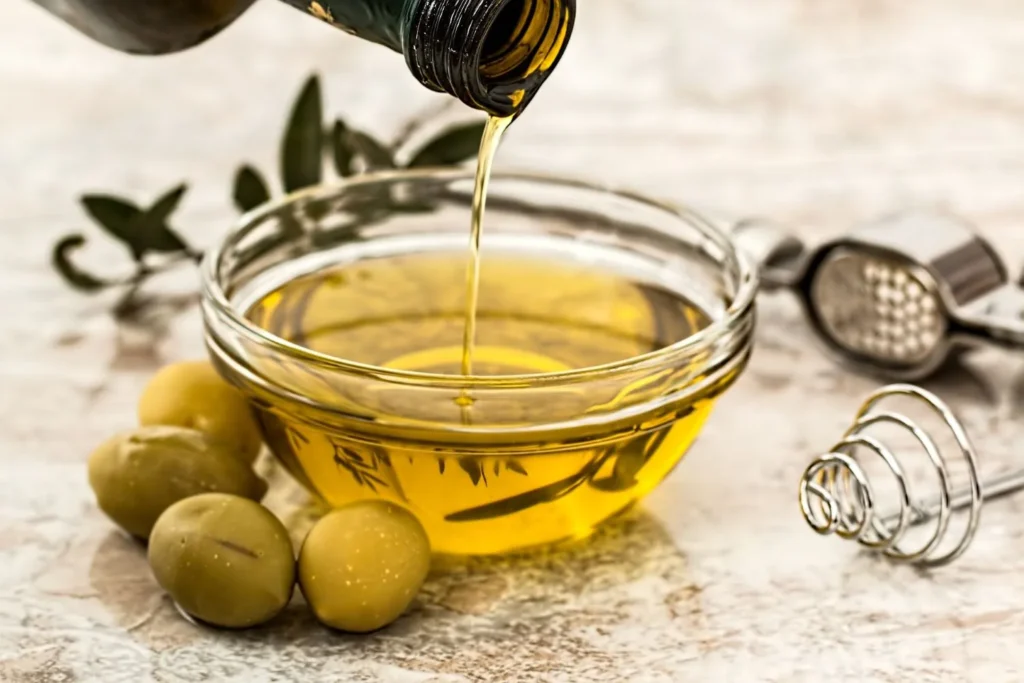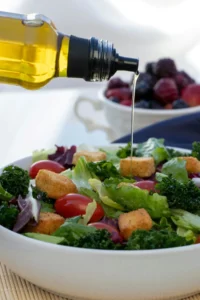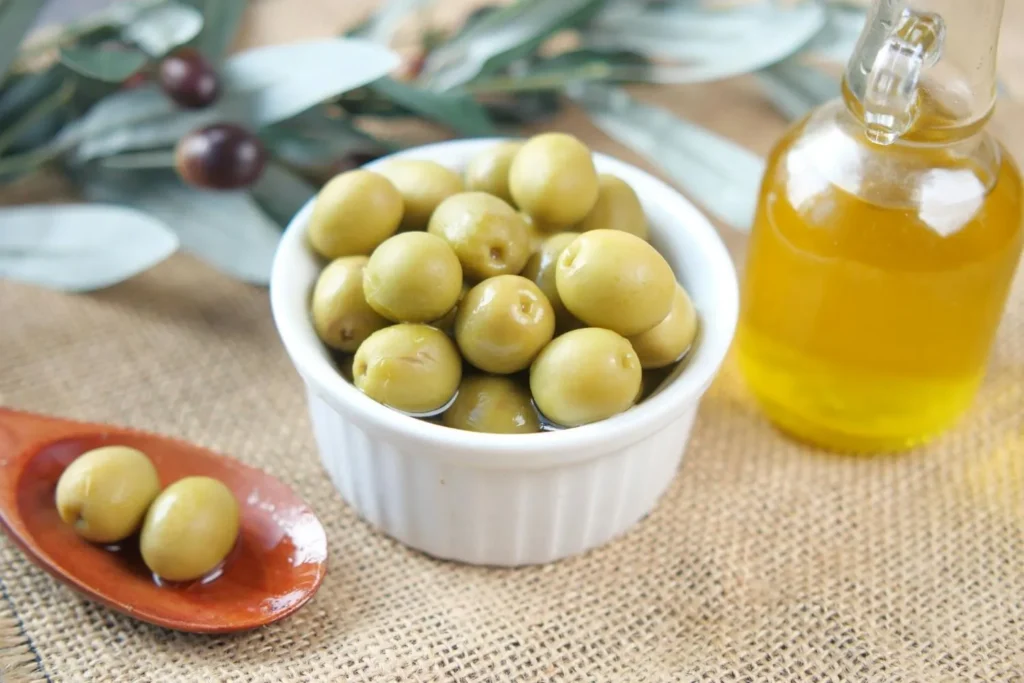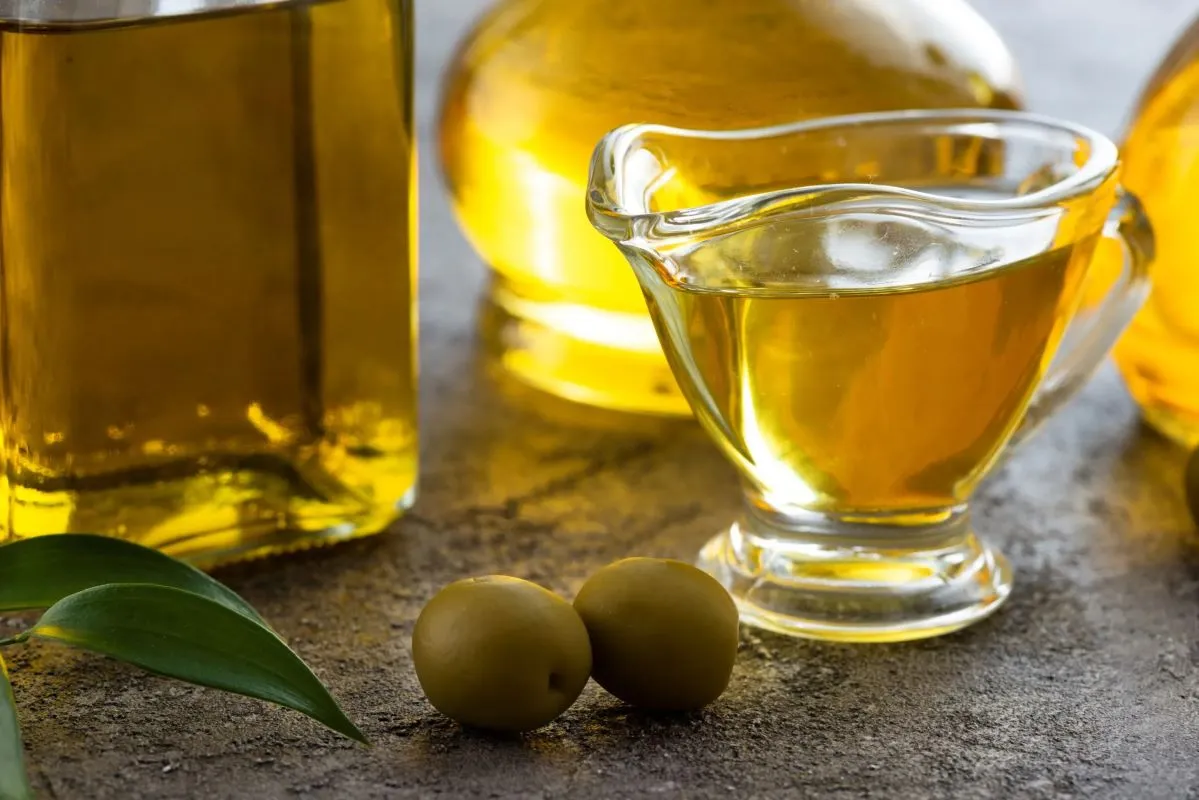Olive oil is essential in cooking and medicine. People think it’s so special that it’s like having gold because of all the good things it can do. It’s essential in Mediterranean food and many other cooking types worldwide. Olive oil has been around for a long time, and it’s a symbol of tradition and culture. Let’s learn more about it! We’ll talk about its history, different types, how it’s good for you, how we can make sure we’re using it in a way that’s good for the environment, and how we can use it in cooking today.
Historical Roots:
Long ago, people thought the olive tree was special in places like Greece, Rome, and Egypt. They saw it as a symbol of having a lot of good things, peace, and doing well. The olive trees grew in sunny places around the Mediterranean Sea. People started growing olives in other parts of the world too, bringing with them the old knowledge and skills of cooking.
Evolution in Production Methods:
While the essence of olive oil production remains deeply rooted in tradition, modern techniques have revolutionized the industry, enhancing quality, efficiency, and accessibility. From hand-pressed methods of antiquity to state-of-the-art extraction processes, olive oil production has evolved to meet the demands of a global market while honoring its artisanal heritage.
Cultural Significance:
Olive oil holds a special place in every culture. It’s not just an ingredient; it’s a way of life. In households, olive oil is the cornerstone of cooking, gracing dishes with its distinctive taste. From drizzling it over bruschetta to incorporating it into pasta sauces and salads, olive oil is a fundamental cuisine component. Beyond the kitchen, olive oil also plays a role in religious and social traditions. It has been used in religious ceremonies for centuries, symbolizing purity and abundance. Olive oil festivals are celebrated in various towns across the world, bringing communities together to honor this vital agricultural product through tastings, workshops, and cultural events.

Diverse Types of Olive Oil:
The world of olive oil is replete with diversity, offering a spectrum of flavors, aromas, and textures to tantalize the senses. Extra virgin, virgin, and refined olive oils each possess unique characteristics, derived from factors such as extraction methods, acidity levels, and terroir. Extra virgin olive oil, prized for its unparalleled quality and flavor, undergoes minimal processing and retains the pure essence of the olive fruit.
Health Benefits:
Beyond its culinary allure, olive oil boasts a plethora of health benefits that have earned it the moniker of “liquid gold” in nutritional circles. Rich in monounsaturated fats, antioxidants, and anti-inflammatory compounds, it is renowned for its ability to promote heart health, lower cholesterol levels, and combat oxidative stress.
Sustainability Considerations:
As the demand for olive oil continues to soar, sustainability has emerged as a pressing concern within the industry. Environmental impacts, fair trade practices, and the proliferation of organic farming methods are central considerations in the quest for a more equitable and eco-conscious olive oil industry. It offers a plethora of benefits, spanning from culinary uses to skincare and beyond. Here’s a breakdown of some key benefits:
Culinary Benefits:
- Heart Health: Olive oil is rich in monounsaturated fats, which can help reduce LDL (bad) cholesterol levels and lower the risk of heart disease and stroke.
- Antioxidant Content: Extra virgin olive oil contains high levels of antioxidants, including vitamin E and phenolic compounds, which help protect cells from oxidative damage caused by free radicals.
- Anti-Inflammatory Properties: The oleic acid and antioxidants found in olive oil have anti-inflammatory effects, which may help reduce inflammation and alleviate symptoms of conditions like arthritis and inflammatory bowel diseases.
- Weight Management: Despite being calorie-dense, olive oil may aid in weight management when consumed as part of a balanced diet. Its monounsaturated fats can increase feelings of satiety and reduce the risk of overeating.
Olive oil for skin:
It has been cherished for centuries, not only for its culinary properties but also for its remarkable benefits for the skin. Rich in antioxidants, vitamins, and essential fatty acids, olive oil serves as a versatile and natural solution for various skincare needs. Here’s how it can be beneficial for the skin:
1. Moisturizing and Nourishing:
- It is an excellent moisturizer for the skin, helping to hydrate and soften dry areas.
- Its emollient properties create a protective barrier on the skin’s surface, preventing moisture loss and keeping the skin supple.
2. Antioxidant Protection:
- The high content of antioxidants, such as vitamin E and polyphenols, helps to neutralize free radicals that can damage skin cells and accelerate aging.
- Regularly applying it can help protect the skin from environmental stressors like pollution and UV radiation.
3. Anti-Inflammatory Benefits:
- Oleic acid, a major component of olive oil, possesses anti-inflammatory properties that can help calm irritation, redness, and inflammation in the skin.
- It can benefit soothing conditions like eczema, psoriasis, and dermatitis.
4. Gentle Makeup Remover:
- It is an effective and gentle makeup remover, especially for removing stubborn eye makeup and waterproof cosmetics.
- Its emollient nature helps dissolve makeup while nourishing the delicate skin around the eyes.
5. Skin Repair and Healing:
- The fatty acids present in olive oil can promote skin repair and regeneration, making it beneficial for healing minor wounds, cuts, and abrasions.
- It can also help alleviate symptoms of sunburn and soothe irritated or chapped skin.
6. Anti-Aging Effects:
- Regular use of olive oil may help reduce the appearance of fine lines, wrinkles, and age spots, promoting a more youthful complexion.
- Its moisturizing and antioxidant properties contribute to improving skin elasticity and firmness.
How to Use Olive Oil for Skincare:
- As a moisturizer: apply a small amount of olive oil to clean, damp skin and massage gently until absorbed. Use as needed, especially on dry areas like elbows, knees, and heels.
- As a makeup remover, dab a few drops of it onto a cotton pad and gently wipe away makeup, including waterproof mascara.
- As a face mask: Mix olive oil with natural ingredients like honey, yogurt, or oatmeal to create a hydrating and nourishing face mask. Leave on for 10–15 minutes before rinsing off with warm water.
- While it is generally safe for most skin types, it may not be suitable for extremely oily or acne-prone skin, as it can potentially clog pores and exacerbate breakouts.
- Always perform a patch test before using it on the skin, especially if you have sensitive skin or allergies.
Olive oil for hair
Using it for your hair can have several benefits. It can nourish and protect your hair because it contains healthy fats and antioxidants. It can also help with dryness, itching, and repairing damage to your hair. You can use it in various ways, such as a hot oil treatment, in hair masks, as a leave-in conditioner, and even as a styling product. It is a versatile and natural option for maintaining healthy and beautiful hair.
It can make your scalp healthy, especially if you have dry, thick hair. Depending on your hair type, it might help with dryness, itching, and repairing damage.
Extra virgin is a great natural oil to use in your hair care routine. It’s packed with beneficial fatty acids and antioxidants that can help nourish and protect your hair. You can use it as a hot oil treatment, in hair masks, as a leave-in conditioner, and even as a styling product.

Other Benefits:
- Digestive Health: It has been shown to have mild laxative effects and may help promote healthy digestion by lubricating the digestive tract and stimulating bile production.
- Brain Health: Some studies suggest that the monounsaturated fats in it may help improve cognitive function and reduce the risk of age-related mental decline and neurodegenerative diseases like Alzheimer’s.
- Cancer Prevention: While more research is needed, some studies have suggested that the antioxidants in it may help protect against certain types of cancer, including breast and colon cancer.
It is a natural and versatile skincare remedy that can provide numerous benefits, from moisturizing and protecting the skin to promoting healing and rejuvenation. Incorporating olive oil into your skincare routine can help you achieve healthier, more radiant skin.
Benefits of drinking olive oil in the morning
Drinking in the morning is a practice that some people believe can confer health benefits, although it may not be suitable for everyone. Here are some potential benefits attributed to consuming in the morning:
1. Digestive Health:
- Consuming a small amount of olive oil in the morning may help stimulate bile production and promote healthy digestion.
- The monounsaturated fats in it can help lubricate the digestive tract, easing the passage of food and preventing constipation.
2. Weight Management:
- Some studies suggest that consuming it, particularly extra virgin olive oil, may help promote feelings of satiety and reduce appetite, which could support weight management efforts.
- The healthy fats in it can help stabilize blood sugar levels, preventing spikes and crashes that can lead to overeating.
3. Nutrient Absorption:
- Pairing it with certain nutrients, such as fat-soluble vitamins like vitamin D, vitamin E, and vitamin K, may enhance their absorption by the body.
- Consuming it with a nutrient-rich breakfast, such as eggs or vegetables, can help maximize the absorption of essential nutrients.
4. Antioxidant Protection:
- It is rich in antioxidants, including vitamin E and phenolic compounds, which help protect cells from oxidative damage caused by free radicals.
- Drinking olive oil in the morning may help boost antioxidant levels in the body, support overall health, and reduce the risk of chronic diseases.
5. Cardiovascular Health:
- The monounsaturated fats in olive oil have been linked to improved heart health by lowering LDL (bad) cholesterol levels and reducing the risk of heart disease and stroke.
- Consuming it in the morning as part of a heart-healthy diet may help support cardiovascular function and reduce inflammation in the body.
Caution and Considerations:
- While olive oil offers potential health benefits, it is calorie-dense, with approximately 120 calories per tablespoon. Drinking excessive amounts of it can contribute to weight gain.
- Some people may experience digestive discomfort or diarrhea if they consume too much olive oil, especially on an empty stomach.
- It’s important to choose high-quality, extra-virgin olive oil from reputable sources to ensure maximum nutritional benefits.
- Drinking it alone in the morning may not be suitable for everyone, and individual tolerance levels may vary.
While drinking olive oil in the morning may offer certain health benefits, it’s essential to do so in moderation and consider individual health considerations and preferences. Incorporating it into a balanced diet alongside nutrient-rich foods can help maximize its potential benefits while supporting overall health and well-being.

Practical Tips:
Selecting, storing, and utilizing olive oil with care is essential to preserving its flavor and nutritional integrity. Opt for high-quality, cold-pressed oils from reputable producers, store them in a cool, dark place away from heat and light, and experiment with different varieties to discover your preferred flavor profile.
Conclusion:
In the tapestry of culinary wonders, olive oil shines as a timeless symbol of tradition, taste, and vitality. From its ancient origins to its modern-day manifestations, olive oil embodies the essence of cultural exchange, culinary craftsmanship, and holistic well-being. As we embrace the allure of liquid gold in all its forms, let us savor the richness of its history, celebrate the diversity of its flavors, and toast to a future illuminated by the golden glow of the olive tree.



